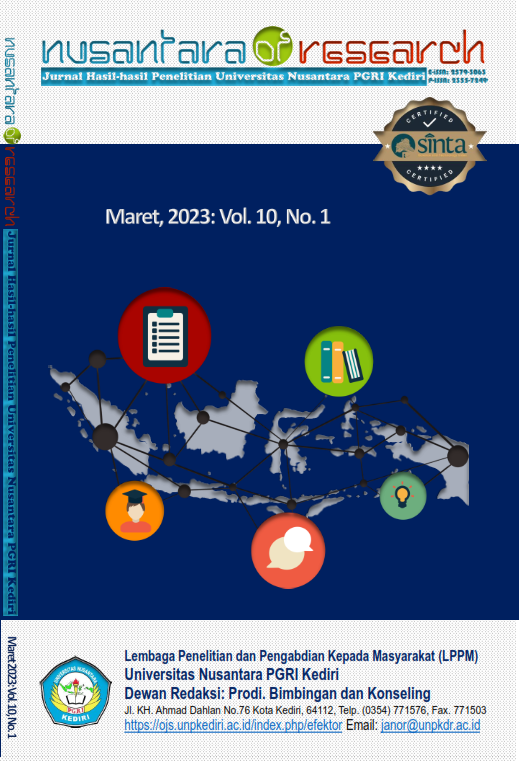Reframing: Cognitive Counseling Strategy to Achieve Student Happiness in Post Pandemic
Main Article Content
Abstract
Happiness is something that every individual desires. Happy Feelings Refer to well-being of mental health. Not students at school. High academics that are not in accordance with abilities and good self-management can lead to unhappy conditions. Happiness (happiness) is synonymous with the term emotional well-being (EWB). Emotional well-being (EWB) or emotional well-being is an individual's state consisting of life satisfaction and positive feelings. The problem that occurs is that students feel less happy when they are at school because they do not immediately take perspective on a situation. For example, feeling that school is a place full of burdens, school is a boring place, and so on. The reframing technique is one of the techniques of cognitive therapy that aims to reorganize the desired emotional content and direct/reframe it towards a rational mind, so that the counselee can have various points of view on the self-concept/cognitive concept in various situations. This research method is literature study. Analysis of the data used is content analysis. The result of this research is the elaboration of theoretical studies on reframing techniques in cognitive therapy approaches that can be used to achieve students' emotional well-being.
Downloads
Article Details
Issue
Section
Authors who publish with this journal agree to the following terms:
- Copyright on any article is retained by the author(s).
- The author grants the journal, the right of first publication with the work simultaneously licensed under a Creative Commons Attribution License that allows others to share the work with an acknowledgment of the work’s authorship and initial publication in this journal.
- Authors are able to enter into separate, additional contractual arrangements for the non-exclusive distribution of the journal’s published version of the work (e.g., post it to an institutional repository or publish it in a book), with an acknowledgment of its initial publication in this journal.
- Authors are permitted and encouraged to post their work online (e.g., in institutional repositories or on their website) prior to and during the submission process, as it can lead to productive exchanges, as well as earlier and greater citation of published work.
- The article and any associated published material is distributed under the Creative Commons Attribution-ShareAlike 4.0 International License
How to Cite
References
Arikunto, S., & Jabar, C. S. A. (2010). Evaluasi Program Pendidikan. Bumi Aksara.
Aulia, F. (2018). Improving Student Well-being in School. International Conference of Mental Health, Neuroscience, and Cyber-Psychology, 172–179. https://doi.org/https://doi.org/10.32698/25275
Beck, J. S. 2011. Cognitive Behavior Therapy: Basics and Beyond. New York: The Guilford Press.
Coermir, S., Nurius, P. S., & Osborn, C. J. 2009. Interviewing and Change Strategies for Helpers: Fundamental Skills and Cognitive Behavioral Interventions. USA: Brooks/Cole.
Corey, G. 2009. Theory and Practice of Counseling and Psychotherapy. Belmont: Thomson Brooks/Cole.
Coverdale, G. E., & Long, A. F. (2015). Emotional wellbeing and mental health: An exploration into health promotion in young people and families. In Perspectives in Public Health (Vol. 135, Issue 1). https://doi.org/10.1177/1757913914558080
Froggatt, W. 2009. A Brief Introduction To Cognitive Behavior Therapy. New Zealand, 1-12. This document is copyright © to the author (2001-6).
Gerber, P. J., Reiff, H. B., & Ginsberg, R. 1996. Reframing The Learning Disabilities Experience. Journal Learning Disability, 29 (1): 98-101.
Kemenkes RI. (2021). Situasi Terkini Perkembangan Coronavirus Disease (COVID-19). Kemnkes RI.
Keyes, C. L. M. (2002). The mental health continuum: From languishing to flourishing in life. Journal of Health and Social Behavior, 43(2). https://doi.org/10.2307/3090197
Langeland, E. (2014). Emotional Well-Being. Cmaj, 1874–1876. https://doi.org/10.1007/978-94-007-0753-5
Lent, R. W. (2004). Toward a unifying theoretical and practical perspective on well-being and psychosocial adjustment. Journal of Counseling Psychology, 51(4), 482–509. https://doi.org/10.1037/0022-0167.51.4.482
Oemarjoedi, A. K. 2003. Pendekatan Cognitive Behavior dalam Psikoterapi. Jakarta: Kreatif Media.
Puspitarini, I. Y. D., & Nawantara, R. D. (2021). KELAYAKAN PAKET KONSELING KELOMPOK BERBASIS RASIONAL–EMOTIF–PERILAKU UNTUK MEREDUKSI BURNOUT SISWA SMA. JBKI (Jurnal Bimbingan Konseling Indonesia), 6(1). https://doi.org/10.26737/jbki.v6i1.2056
Rizaldi, D. R., dkk. 2022. Efforts to Revitalize Student Learning Motivation After The Covid 19 Pandemic. Southeast Asian Journal of Uslamic Education Management, 3 (1), 89-102. https://doi.org/10.21154/sajiem.v3i1.87
Salavera, C., Usan, P., Teruel, P., & Antonanzas, L. (2020). Eudaimonic Well-Being in Adolescents: The Role of Trait Emotional Intelligence and Personality. Journal Sustainability, Vol. 12.
Seligman, M. (2002). Authentic Happiness: Using The New Positive Psycholoy to Realize Your Potential for Lasting Fulfillment. The American Journal Of Psychiatry, 161(5), 936–937. https://doi.org/10.7748/ns.2.28.34.s65
Tumanggor, R. O. (2018). PEMAHAMAN WELL-BEING DARI PERSPEKTIF FILSAFAT. Jurnal Muara Ilmu Sosial, Humaniora, Dan Seni, 2(1). https://doi.org/10.24912/jmishumsen.v2i1.1628
White, M. D., & Marsh, E. E. (2006). Content analysis: A flexible methodology. Library Trends, 55(1). https://doi.org/10.1353/lib.2006.0053
World Health Organization. (2012). Adolescent mental health: mapping actions of nongovernmental organizations and other international development organizations. WHO Press.
Zed, M. (2003). Metode Penelitian Kepustakaan. In Yayasan Obor Indonesia.




